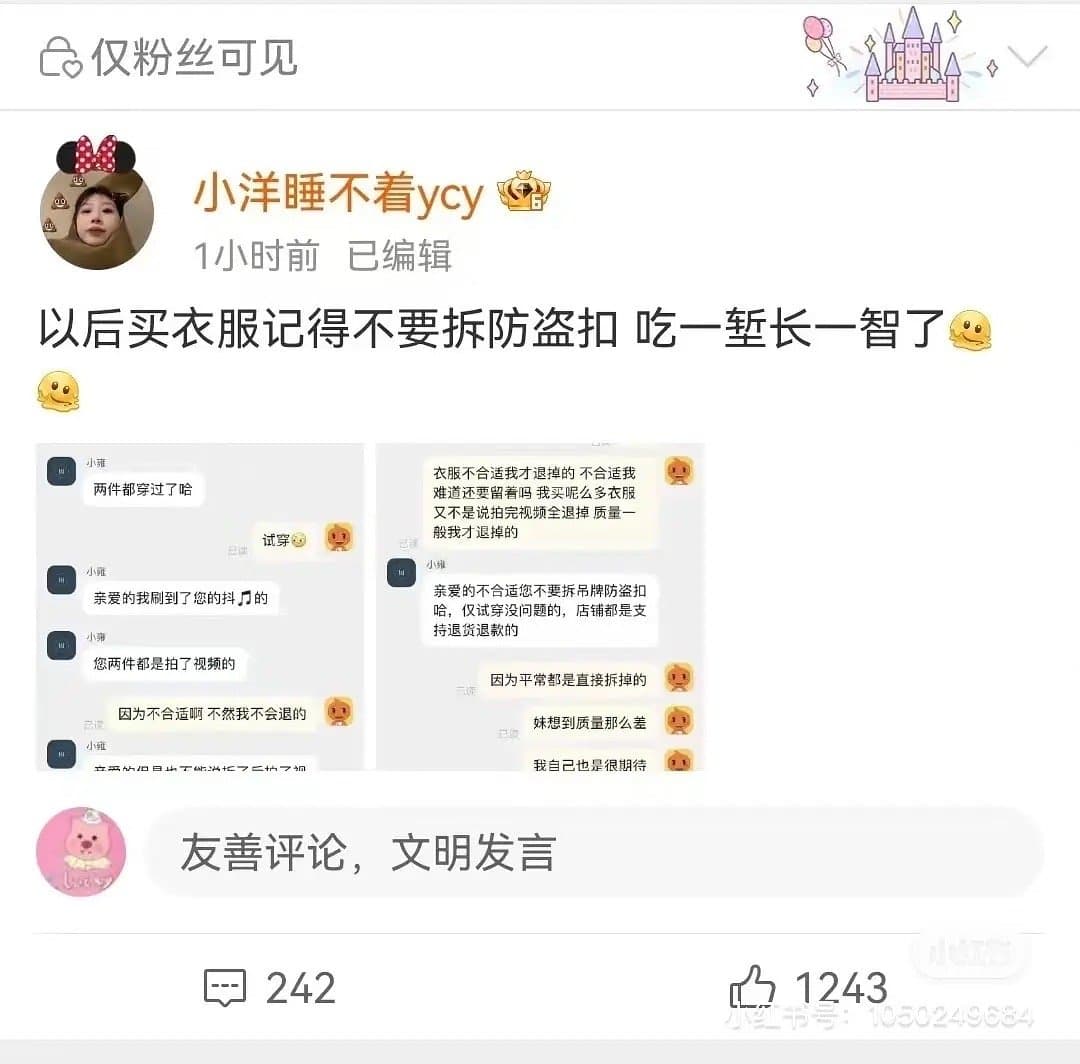Chinese Influencer Faces Backlash for Fraudulent Clothing Return Attempt
*Note: The text provided includes direct translations of social media posts and usernames, as well as image descriptions, which have been omitted or altered for clarity and brevity in the following article. The original text is available upon request.* A Chinese social media influencer with millions of followers, known as "Little Ocean Sleeps Unhappily" (小洋睡不着), has faced backlash and issued an apology for attempting to fraudulently return clothing items after removing their security tags and wearing them.

29 February 2024
The incident has sparked a wider debate on consumer rights, influencer responsibility, and online conduct. The controversy began when Little Ocean Sleeps Unhappily, a popular blogger in China, purchased two garments from an online store. After receiving the items, she removed their security tags and wore them in a video, then requested a refund from the seller, claiming the clothes were not satisfactory.
The seller refused, citing the removed security tags as a reason they could not accept the return. In response, Little Ocean Sleeps Unhappily posted screenshots of her conversation with the seller on her social media accounts, leading to a heated online debate between her followers and other users. Many accused the influencer of being privileged and entitled, while others criticized her for not understanding the basic rules of online shopping and trying to manipulate the system for her benefit. After the backlash, Little Ocean Sleeps Unhappily posted footage of herself tearfully apologizing for her actions. In the video, she explained that she had not intended to deceive the seller or mislead her followers, claiming she had genuinely believed that the removed security tags would not prevent her from returning the items if they were not to her liking. Following the apology, the seller ultimately agreed to refund Little Ocean Sleeps Unhappily, and the influencer pledged to be more mindful of her behavior and choices in the future.

However, this incident has raised questions about the expectations and responsibilities of online influencers, as well as the tensions between the privileges afforded to popular social media stars and the rights of everyday consumers. In addition to debating Little Ocean Sleeps Unhappily's conduct, many social media users have also criticized her response to the controversy. Some have accused her of trying to deflect blame onto her fans, who she claims encouraged her to demand the refund, while others have questioned the sincerity of her apology, pointing out that she was well aware of the company's no-return policy when she posted the video of herself removing the security tags.
This is not the first time an online influencer in China has faced criticism for seemingly taking advantage of their status. In 2017, another popular blogger, known as "Mr. Bags," was caught in a similar controversy after urging his followers to go on a "shopping spree" following a massive discount promotion, leading to widespread chaos and store damage. The incident has prompted further discussion on the role of social media influencers and the need for greater accountability and responsibility in the online space.
As online shopping continues to grow in popularity in China and around the world, it is essential to ensure that both consumers and influencers are aware of their rights and responsibilities within this rapidly evolving ecosystem. In conclusion, the Little Ocean Sleeps Unhappily controversy has exposed the complex interplay of privilege, responsibility, and consumer rights in the world of online influencers. While the incident serves as a cautionary tale for both bloggers and their followers, it also underscores the need for greater education and awareness regarding the rights and responsibilities of all parties involved in the online shopping landscape.
As the digital world continues to shape our lives and purchasing habits, it is crucial to ensure that every participant understands the rules of the game and plays their part in fostering a fair and responsible online marketplace.
Share this article
Related Articles

Ruby Lin Says She and Wallace Huo Are Still “Adjusting” After Seven Years, Igniting Viral Debate on Celebrity Marriages
By Trending on Weibo
Entertainment
15 Sept 2025

“Too Much Qi”: A Light‑hearted Joke on ‘Sisters Who Make Waves’ Sparks Celebrity Smear Campaign, Wellness Debate and Online Meme Frenzy in China
By Trending on Weibo
Entertainment
15 Sept 2025
Li Ronghao’s Tour Surge, New Video Release, and NFC Album Glitch Spotlight Quality‑Control Challenges in China’s Pop Scene
By Trending on Weibo
Entertainment
13 Sept 2025
Mu Zhicheng Emerges as TF Entertainment’s Hottest Trainee Amid Viral Social‑Media Surge and Anticipated Debut
By Trending on Weibo
Entertainment
13 Sept 2025

China’s Emerging Acting Sensation Zhang Kangle Poised for High‑Profile Film, Fashion, and Digital Stardom
By Trending on Weibo
Entertainment
13 Sept 2025